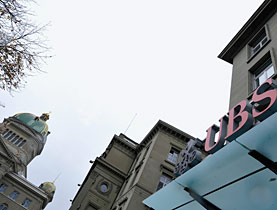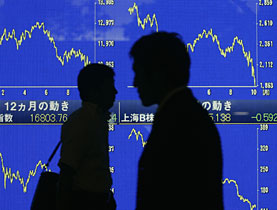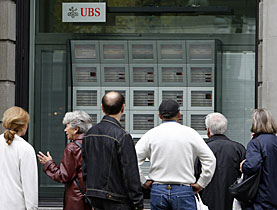“Swiss banks back on level playing field”

Banking experts say the plan to inject SFr6 billion ($5.23 billion) into UBS is not a rescue package so much as a move to keep Swiss financial centres competitive.
The main political parties agreed the bailout had been necessary, but were critical of UBS’s conduct.
“I see it more as a stabilisation package to get the Swiss banks back on a level playing field with their global competitors,” Rainer Skierka, an analyst with Bank Sarasin, told swissinfo.
“It was clear that the bail-out actions by the US, Britain and the European Union would put Swiss banks at a disadvantage because all the other banks could get better terms from government financing.”
Bernard Lambert, an analyst from Pictet bank, said the decision by the federal government, the Swiss National Bank (SNB) and the Swiss Federal Banking Commission to intervene ultimately does the same thing that neighbouring countries have been doing in bailing out their ailing banks.
“It is regrettable that the authorities didn’t do it last weekend,” he said.
A call for help
For weeks the federal government and finance ministry had maintained that no rescue package was necessary and that the situation was under control since Swiss financial centres had plenty of capital.
But by Sunday the situation at UBS had soured enough to spurn the bank’s chairman, Peter Kurer, to approach the Swiss Federal Banking Commission for assistance.
On Thursday morning the federal government announced that the SNB would take control of $60 billion worth of sour assets at UBS. Credit Suisse had been offered a deal as well but the bank “decided not to participate at this time”.
Credit Suisse announced that it is raising SFr10 billion from private investors including the Qatar Investment Authority.
“If Credit Suisse had accepted the help of the Swiss government, it would have weighed heavily on their reputation,” Skierka said.
“Furthermore, the government support takes away some freedoms because it comes with restrictions on dividend payments and share buy backs.”
Gritted Teeth
The Swiss Bankers Association said the financial package is “the right measure at the right time”.
While Switzerland’s political parties agree, they have also criticised the federal government for breaking down and charge UBS with a lack of oversight.
The centre-right Radical Party is “aghast” at the mistakes UBS has made. Moreover, executives there should return their bonuses from last year, party officials said.
The centre-left Social Democratic Party says banks should face tighter limits in relation to bonuses and salaries. The government should have a seat on UBS’s board, the party said.
The rightwing Swiss People’s Party said it fundamentally opposes state intervention in the market but that UBS could not be allowed to fail.
Meanwhile the Green Party wants to sue top banking executives, especially at UBS, and has teamed up with the Social Democrats to demand a special session in the coming week.
Who will pay?
Christian Wanner, president of the conference of cantonal finance ministers, says the wrong people will pay for the savings package since taxpayers must dig into their pockets and not those responsible. The federal government, however, doesn’t have a choice, he said.
“We are not giving a present to UBS,” said Jean-Pierre Roth, SNB chairman. “We have been working on this package for weeks. The plan conforms to the market.”
Meanwhile, some believe the package doesn’t go far enough. While UBS will be given a hand, the economic problem won’t be solved in the long term, said Daniel Lampart, chief economist at the Swiss Union Alliance.
Other unions, like Travail.Suisse, say the country needs a stimulus programme to avoid banks getting billions while employees are hit with a recession.
Janwillem Ackett of Julius Baer says keeping a proper perspective is key.
“Let’s not exaggerate this intervention,” he said. “The situation in Switzerland is much more stable than elsewhere.”
The Swiss Market Index ended the day down 3.26 per cent to close at 5,718. UBS shares sank in afternoon trading to close at SFr19.09, down 4.93 per cent. Credit Suisse also closed in the red at SFr45.50 a share, down 0.87 per cent.
swissinfo with agencies
Clients have withdrawn €54 billion (SFr82.23 billion) in assets from UBS during the past weeks.
Jean-Pierre Roth, head of the SNB, says UBS remains strong in terms of capital but is suffering from a problem of confidence.
Meanwhile an investigation by the Federal Banking Commission has reached the same conclusions as UBS as to how the downturn came about. Based on internal investigations at the bank, the commission found management lapses and “insufficient identification of pertinent risks”.
According to the office, UBS didn’t know until August 2007 the exact nature of the risks in the subprime realm. Bankers had too much confidence in risk measurement mechanisms, which, retrospectivitely, is “a serious lack on the part of the bank”.
At the start of the week the Swiss government said that it did not need to follow the example of many other countries, which had raised massive amounts of taxpayers’ money to bail out stricken banks.
Following the United States’ $700 billion (SFr790 billion) rescue package earlier this month, Britain announced a £37 billion (SFr73 billion) cash injection while Germany was poised to prop up its ailing financial system with a €470 billion (SFr724 billion) hand out.
Spain said it would provide up to €100 billion of guarantees for new debt issued by commercial banks in 2008. Norway and Portugal have also followed suit with their own bail out cash packages.
Germany, New Zealand and the United Arab Emirates are the latest countries to guarantee all bank deposits.
Iceland is close to bankrupcy.

In compliance with the JTI standards
More: SWI swissinfo.ch certified by the Journalism Trust Initiative



You can find an overview of ongoing debates with our journalists here. Please join us!
If you want to start a conversation about a topic raised in this article or want to report factual errors, email us at english@swissinfo.ch.